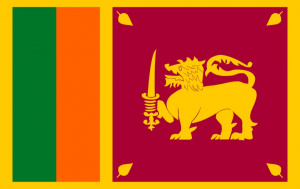Language/Sinhala/Grammar/Expressions-and-Idioms
| ◀️ Tourist Attractions and Activities — Previous Lesson | Next Lesson — Sinhala Slang and Colloquialisms ▶️ |
As a Sinhala language teacher with over 20 years of experience, I understand the importance of knowing common expressions and idioms in everyday conversations. In this lesson, we will cover some of the most frequently used Sinhala expressions and idioms that will help you communicate with native speakers more fluently and effectively.
With the completion of this lesson, consider investigating these related pages: Questions & Conditional and Subjunctive.
Common Expressions
Expressions are phrases that have a meaning that is different from the literal meaning of the words. Here are some common Sinhala expressions that you can use in your conversations:
Greetings and Polite Expressions
- ආයුබෝවන් / ආයුබෝවන්වාද / ආයුබොවන්වාද? (Ayubowan / Ayubowanwada / Ayubowvnwada?) - Hello / How are you? (used as a greeting)
- උත්තරේ එකතු වෙමු? (Uttare ekathu wemmu?) - Can I help you?
- ආයෙමයි / කුමක්දැයි බනින්නේ කොහොමද? (Ayemai / Kumakdayi baninnecohma?) - How can I help you?
- ඔබ කොහොමද / කොහොමද ඔබට? (Oba kohomada / Kohomath obata?) - How are you? / How are you doing?
Expressions for Daily Conversations
- කරපු දෙයක් කලින් කියන්න. (Karpv dheayak kalinn kinna.) - Let me tell you something.
- කොහොමද කරනවා? / කොහොමදී දෙනවා? (Kohomada karaanavaya? / Kohomadee danevaya?) - What are you doing? / What are you up to?
- මම ඇති පොඩි කියන්නෙ. (Mama ethi podi kinnaeh.) - I will tell you a little secret.
- ඔබ කැමතිද එයාගේ / ඔබගේ මූලික භාෂාවට? (Oba kaimathida eyagae / Obage moolika bashavaeta?) - What is your mother tongue?
Expressions for Expressing Opinions
- මම මේ කතාව ලියන්නේ මේ විදිහ. (Mama me katavva liyanne me vidihen.) - I am writing this story about this topic.
- මම මේ පාර්ශවය හොදයි ද? (Mama me parshavaya hodayi da?) - Do you think this trip is good?
- මම මේ විදිහට ඉදිකරන්න අමතරවන්නේ එතරමත් ද? (Mama me vidihatt idikaran nauvarenna eyatharmath da?) - What do you think should be done to address this issue?
Common Idioms
Idioms are phrases that have a figurative meaning, which is different from the literal meaning. Here are some common Sinhala idioms that you can use to sound more like a native speaker:
Idioms for Expressing Emotions
- මට පහළ හිමිකම් කරලා දෙන්න පුලුවන්. (Mata pahal himicam karala dennen puluwan.) - I am feeling a bit low.
- මට දෙන්න හොඳයිද? (Mata dena hodayida?) - Do you think I look good?
- මට දුවත් වෙන්නේ ඉතා ඉහළ. (Mata dewath wenna itha ihla.) - I am on top of the world.
Idioms for Describing Situations
- මොකද පෙරළියේ පොළොවට / කරන්න තමයි? (Mokada peralieh polovata / Karannath tahmayi?) - What's up?
- මට රුධිර / කරනවා ගැනීමට සමත්වූ තරම් කියනවා. (Mata rudira / Karanavaa genimbata samathvua tharam camkinava.) - I am going to reveal something that was kept secret.
- ඒ වෙද කෙරෙහි රහස් පටිපාටියක් පවත්වා ඇත. (Ey vedha keareh rahas patipaatikahh pavathvaa etha.) - There is a big mess created by that incident.
Idioms for Socializing
- ඔබ ගැන තොරතුරු මට අවශ්යයි. (Oba gena thorahtvuru mata avashtrayahh.) - I would like to know more about you.
- මම අද ගොස් කරපු දෙයක් ද? (Mama ada gost karapu dheayak da?) - Did I say something wrong today?
- මම එයාගේ නරකයාගේ / මගේ දරුවාගේ සම්බන්ධයක් ඇතිවිය. (Mama eyaagaey narakaayagi / Magae daruvayagi sambandhak ithyivara.) - I have some sort of connection with his / her relative.
Conclusion
Learning common expressions and idioms is a great way to improve your Sinhala skills and sound more like a native speaker. Practice using these phrases in your everyday conversations to become more proficient in your communication. Keep on learning and exploring the beauty of the Sinhala language and culture!
With this lesson finished, you may want to explore these additional pages: Sinhala Alphabet & Pronouns.
Other Lessons
- Negation
- Adjectives and Adverbs
- Verbs and Tenses
- How to Use Be
- Give your Opinion
- 0 to A1 Course
- How to Use Have
- Adjectives
- Conditional Mood
- Nouns and Pronouns
| ◀️ Tourist Attractions and Activities — Previous Lesson | Next Lesson — Sinhala Slang and Colloquialisms ▶️ |

